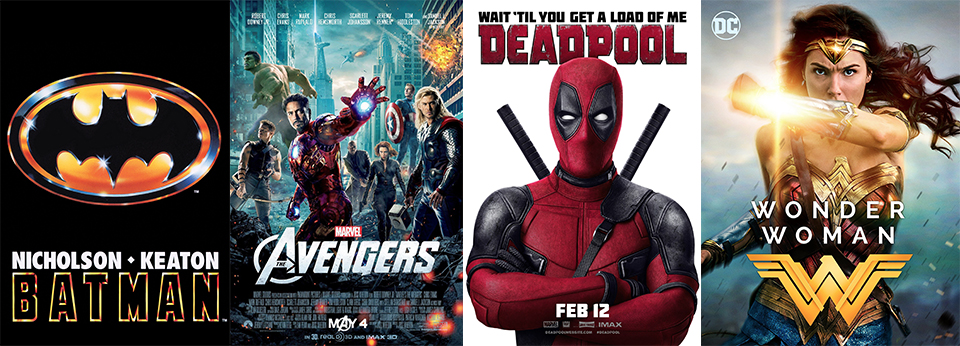Marvel’s “Black Panther” hit theaters two weeks ago, and it continues to dominate the box office. Recent releases such as Jennifer Lawrence’s “Red Sparrow,” and Bruce Willis’ unnecessary “Death Wish” reboot clocked in at $17 million and $13 million, respectively. Their opening weekend came nowhere close to dethroning the Wakandan King who brought in $65.7 million this past weekend. “Black Panther” continues to prove itself as a historic event in the superhero genre by featuring an almost exclusively African-American cast and grossing more than any other Marvel film except the first “Avengers.” Films of this magnitude have the tendency to set a pattern for subsequent films to follow. They prove that a certain method or approach is viable and successful. Audiences can rest easy knowing that “Black Panther” has paved the way for people of color to be effectively represented in superhero movies, but until then, here are four trendsetting comic book films.
- Batman (1989)
Before “Batman,” superheroes were known for their gleeful and often corny camp. Although iconic, Christopher Reeve’s “Superman” from 1978 tends to fall into that category. Director Tim Burton gave a new face to the genre a decade later with a truly somber and murderous depiction of the Caped Crusader who up until that point had only been depicted by Adam West in the “Batman” TV series from the ‘60s. The film delved into the morose world of Gotham City where a giant bat stalks twisted criminals in the night. It owned the fact that Batman—with malevolent villains such as the Joker—belongs to the darker side of comics and should be depicted as such. It proved audiences were willing to accept a darker character, which led to a focus on somber superhero movies such as “Blade” and “The Dark Knight.”
- Avengers (2012)
It is completely impossible to compile a list of influential superhero movies without mentioning the Marvel Cinematic Universe. Nothing quite like it had been attempted before, and Marvel’s grand experiment met its toughest test with the “Avengers.” They followed the formula of giving each character an origin film before putting them together into one action packed, alien punching epic. The experiment of “Avengers” proved successful and Marvel’s prosperity only grew afterwards. The fact that several companies such as D.C. and Universal Pictures have tried to imitate the MCU experiment shows the influence of “Avengers.”
- Deadpool (2016)
“Deadpool” took many audience members by surprise. Until its release, many studios did not see R-rated comic book movies as profitable, let alone one about a lesser known character. R-rated comic book movies tend to have a much lower gross than a PG-13 comic book movie—compare “300’s” total gross of $456,068,181 in 2007 to “The Dark Knight’s” $1,004,558,444 total gross only a year later. “Deadpool” broke that trend when it became the second highest grossing R-rated film of all time, losing to Mel Gibson’s “The Passion of the Christ” by approximately $7,712,221. Companies have since become quicker to put forward R-rated properties such as 2017’s “Logan” or the upcoming “Hellboy” reboot.
- Wonder Woman (2017)
The previous films on this list have been influential within the superhero genre, but “Wonder Woman” created a broader reach by telling a powerful story about a powerful heroine everyone could relate to. The film helped prove the financial viability of superhero movies with female leads because before “Wonder Woman,” female superheroes have lacked any useful representation. Director Patty Jenkins sought to create a universally relatable character, while maintaining the femininity of the character. “Wonder Woman” and “Black Panther” act as milestones in Hollywood for the representation of women and people of color.







